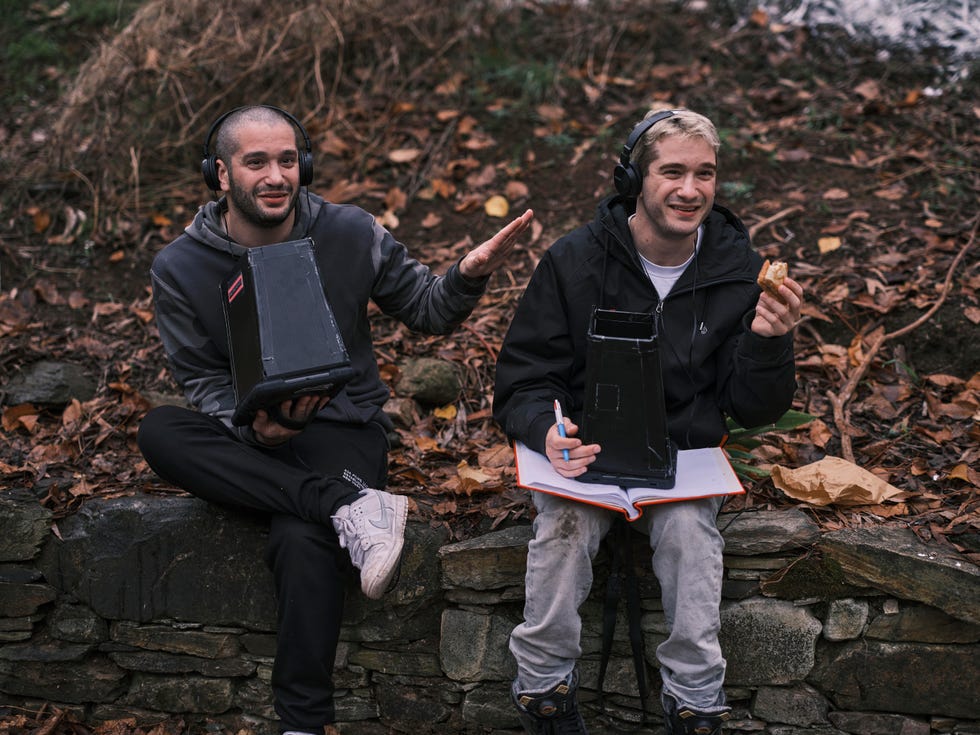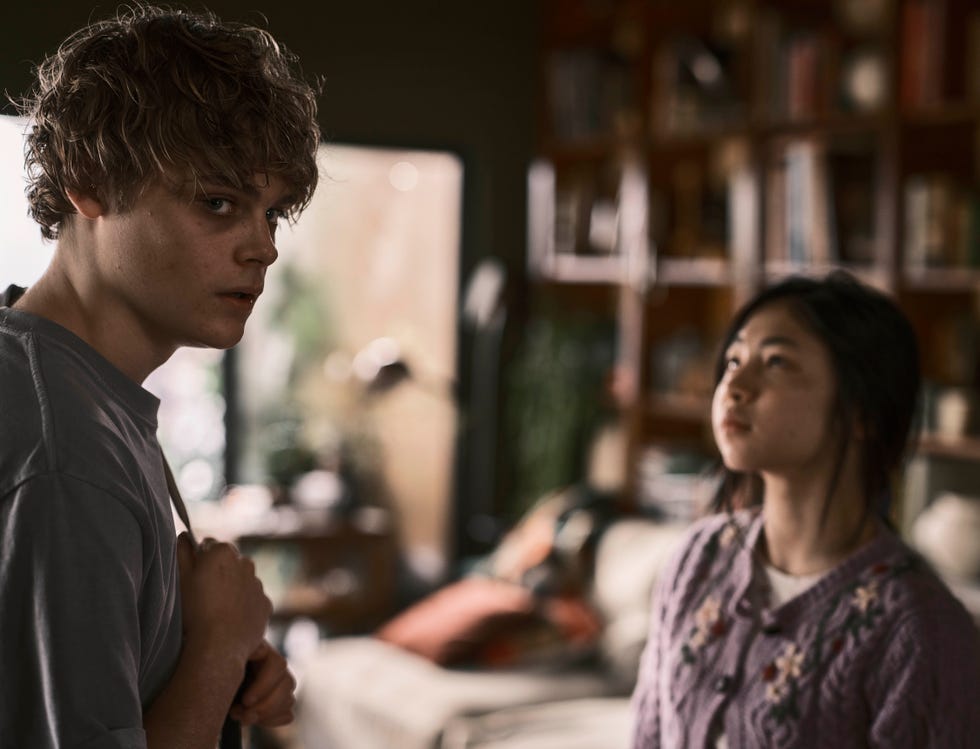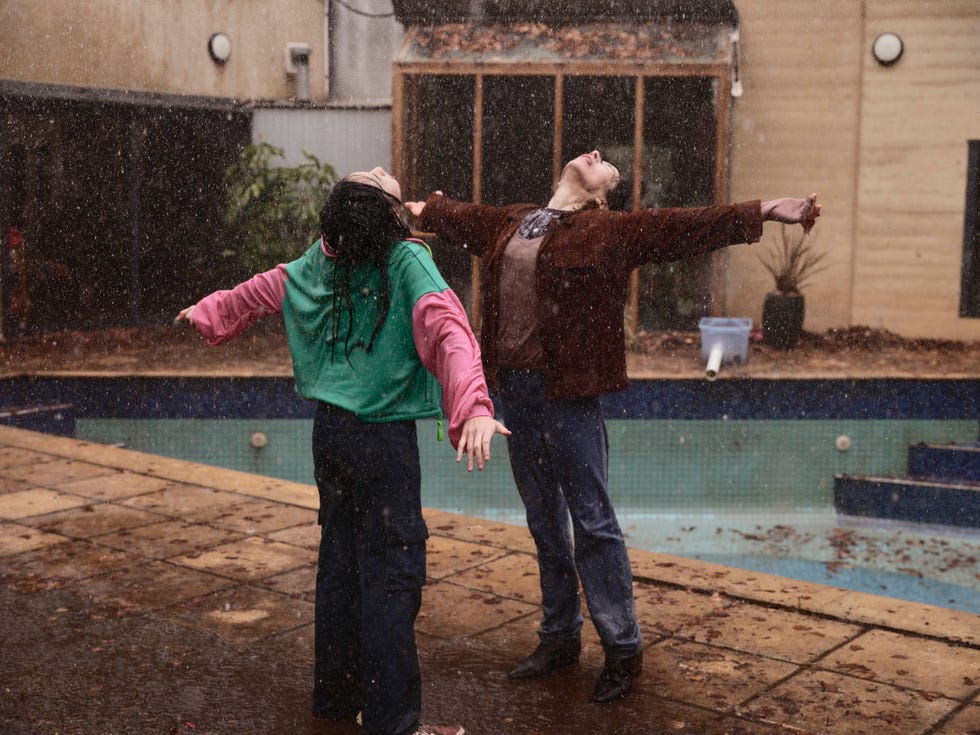How Two Directors—Who Happen to Be Twin Brothers—Transformed Grief into Horror in <em>Bring Her Back</em>

This story contains spoilers for Bring Her Back.
We’re not lacking in great horror films these days, which is exactly why breaking into the genre is not for the weak. So when Australian directors Danny and Michael Philippou debuted their first feature-length horror film Talk To Me in 2022, they had their work cut out for them.
The 32-year-old twins started out as YouTubers known as RackaRacka with a channel that featured backyard wrestling videos and horror-comedy sketches. They hardly had name recognition, let alone an A-lister or two to boost their film, but they harnessed their obsession with video production and storytelling to create A24's Talk To Me. Their efforts paid off: Talk To Me debuted to critical acclaim en route to becoming one of the highest-grossing films in A24's history.
Now, the Philippous have returned with Bring Her Back, which proves that that the duo certainly isn't not a one-hit wonder. The film, which premiered in theaters this past weekend, centers on two siblings: Andy (Billy Barratt) and Piper (Sora Wong), who are suddenly orphaned and have to enter foster care. Their new foster mother, Laura (Sally Hawkins), is dealing with her own grief, in ways that unleash terror on everyone involved. We don't want to spoil too much, only that the Philippous once again dug into themes of unimaginable grief and examined it all through a remarkably disturbing lens—one that will certainly leave you horrified. "Whenever you're writing horror, you're tapping into uncomfortable thoughts and situations," Danny Philippou told me over Zoom before the film's release.
Between Talk to Me and Bring Her Back, we can safely say that the Philippou brothers have established themselves in the modern horror pantheon. Below, the filmmakers open up about new expectations, coming up with Piper and Andy's backstories, and what it truly means to allow yourself to heal.
ESQUIRE: Did you feel any new expectations when you were preparing for your second film?
DANNY PHILIPPOU: I could feel the anxiety mounting. I could feel myself being scared of making anything and those nerves building. I just had to jump into it and confront it. Because I could feel myself getting stuck if I waited any longer. I was like, "You can't stop the process now it's happening. You have to do this. Don't overthink it. Just do it as naturally as you normally would." There's always the fear of the sophomore slump or being a one-hit wonder.
MICHAEL PHILIPPOU: We wanted to stick to our vision and do it our way. We had to not give into predetermined emotions of what we should do next or what has to come. We just decided a story that we wanted to tell and tried to do that as authentically as possible.

"We're universally aligned with a lot of it," says Michael Philippou (left) of working with his brother, Danny (right). "But then we argue about small things."
Working together as brothers, what's your creative process like?
DP: We get very sick of each other. Even with the press tour, initially they had us sitting next to each other on the plane. And I was like, "Please don't do that. We need some distance." But we are naturally drawn to the same things. And we've been making stuff together since we were eight years old. We have a shorthand that comes out of us knowing each other's instincts. It's all about leading different parts of the process. Michael's very hands-on with sound design and with music. And then I'm pretty hands-on with the VFX and the color grade.
MP: We both edit. So our poor editor, he would have an edit of a scene—I would have an edit, and Danny would have an edit. We're universally aligned with a lot of it. But then we argue about small things.

"I could feel myself being scared of making anything and those nerves building," Danny Philippou says. "I just had to jump into it and confront it."
The found-footage scenes felt very different in style and tone to the rest of the film. Tell me about filming those moments.
DP: I dressed as one of the characters, and I bleached my eyebrows. I had these different contact lenses in. And I was shooting the VHS footage. It was about trying to find that grungey, disgusting feeling. It's an inversion of the home videos that Laura is watching of her daughter. It's this upside down version of grieving. We knew we wanted it to feel completely different from anything else in the film. We knew that we wanted the VHS effects to be real. So our VFX guy would go through every take that I picked, and make snow by damaging the VHS in different ways.
How did you come up with the backstories for Piper and Andy?
DP: In the rehearsal process, we act out scenes that aren't in the movie. We have the characters bond together. Billy Barratt and Sora Wong hung out together. They went to sports games and karaoke together to give them a real sibling relationship. Billy was like a big brother to her, because he was a kid actor as well. He was the exact same age that Sora was when he was in his first movie. I love the process of writing character diaries and building them up. So much of filmmaking is about truth and lies, of what you're being told, and what you're not being told. Andy has a secret of this horrible thing that he did, but he's still trying to put rose-colored glasses on for Piper. He's doing that to protect her, but he's damaging her ultimately, because he's not allowing her to be able to take on the world.

"Billy Barratt was like a big brother to her, because he was a kid actor as well," says Danny Philippou.
I love that you trust your audience in your films. There were so many scenes when you imply certain things to the audience, like when Laura washes out Andy's protein powder before the social worker comes over.
DP: It is a such a tricky thing because I like when all the clues are there, and you can put it together. It gives a film rewatchability. With the scary tape that Laura's watching, some audience members are like, "Where'd this tape come from?" But I love that you're dropped into a world that feels real, and we give audiences the chance to pick up on things. But it is scary, because you're like, Are people gonna get this? Does this land? Having things open for interpretation and allowing people to find the meaning themselves is powerful.
MP: There's a lot of stuff with the VHS tape where the answers are there. If you're wanting to look and listen, it can be seen in a different way, like when you picked up with the protein powder scene. I like when you can watch the movie as a whole, but if you want to look deeper, you can.
The sound design of the water falling in the shower, the rain, and the white noise machine is exceptional. Why use the sound of water to create a sense of dread?
DP: When you listen to rain, it can feel relaxing and calming, like the scene with Piper and Laura dancing in the rain. Or it can be really aggressive and scary. That's Andy's point of view. He sees it as a storm coming. And the rain also ties into Laura's grief and her daughter's drowning.
MP: They're connected through trauma by water. It's always fun to thematically thread that through the film. Not just in the script and in performance and visuals, but with those other elements as well and focusing on point of views. In Piper's point of view, she's doesn't have sight, so she's hyperaware of sound.
Is there a backstory behind the scene where Laura forces Andy to kiss his father in the casket?
DP: Whenever you're writing horror, you're tapping into uncomfortable thoughts and situations. I know that with Greek Orthodox funerals, they love the open casket. But there's people that cannot approach the coffin. There's people that can't look into it and refuse to look into it. And there's a thing where you come up and you kiss their foreheads at Greek Orthodox funerals, but again, you don't have to do it. Laura forcing Andy to do it—and knowing it will psychologically damage this kid—is scary. Laura is using skills that she's learned as a child therapist to break this kid. The idea of that scares me.
MP: You're supposed to be able to trust your guardian. She's using that power to twist that idea. You see from the very beginning, she's observing Andy to find the ways to break him.
DP: Laura has this weird relationship with death. She's comfortable with it in this weird way. She's dabbling in the occult. She has this taxidermy dog, and then she's got this sort of taxidermy daughter in the pool shed as well. And she's dressed up bright and colorful at a funeral. It's a different way of perceiving a connection with death.

"Laura has this weird, uncomfortable relationship with death," Danny Philippou adds.
You subvert the guardian and child dynamic elsewhere, too, like when Laura gets drunk with Andy and Sora after their dad's funeral.
DP: It's always about revisiting your childhood and looking at memories and talking to different people, where you realize, That was weird. That was not right. You look back at that and it freaks you out. You can use that to build the story and express it.
MP: In one way, drinking with Laura after their dad's funeral, that's the way that Andy wants to grieve. But then there's that undercurrent of this is not right. A lot of it does come from lived experience, where the person that you're trusting doesn't really have your best interests at heart.
DP: It's all about perspective in the film. Through Andy's lens, this is the coolest thing ever, getting drunk with his guardian. But then you look at it for a different lens, you realize, No this is not right. And that's what we tried to do all the way through the film.
I know you guys aren't grief experts, but what's the best advice you've heard about dealing with grief?
DP: Everyone grieves in their own way and nothing is wrong. You can take your time with something and there shouldn't be a stopwatch where it's like, Oh, that should be done by now. You should allow yourself to heal the way that you need to heal. Unless you're Laura. She's probably the extreme version of it. But there's no right way to do it. You have to do it at your own momentum.
MP: It's the same with mental health—talking to someone and not bottling up those feelings. If you don't, and you just try to deal with things yourself, it can be very damaging and isolating. You need to have someone that you can speak with and you can trust. By doing that, it helps relieve those things. You don't feel so alone. That's what scares us about Laura. The person that you're choosing to confide in is using that against you.
DP: She is trapped in this grief cycle. The kids managed to break out of that in the end. But she's still stuck there, and she's not allowing herself to go out into the world and heal. She's isolating herself in this way. And that idea of a never-ending grief cycle is terrifying.
esquire





